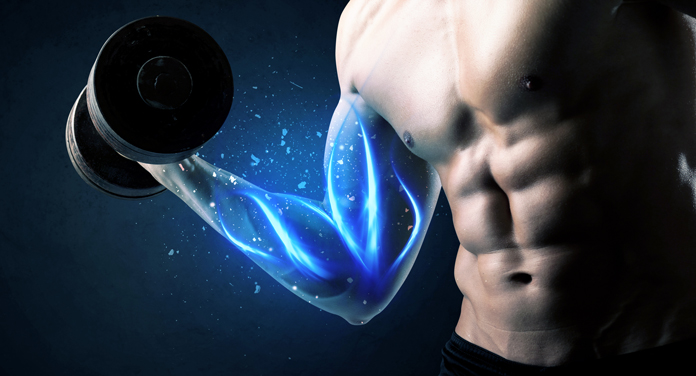How Long Does It Take To Lose Muscle Mass? You’ve worked hard in the gym to build a body you’re happy with. In fact, you’re proud of it and want to keep it, if not improve it even further. But now you are worried that muscle loss will start faster than you would like when you take a break from training.
Don’t worry too much about it. We’ll show you what this muscle loss actually means and how you can minimize it despite a break from training.
Training Breaks Happen - Intentionally Or Unintentionally
Maybe you don’t feel like going to the gym on your set dates. Maybe something private is more important or more pleasant to you. Or you are busy with a problem that takes up all your time. Too much overtime can also significantly reduce your motivation to do sports after work.
Or maybe you’re on a business trip and can’t find a way to train. And finally, you also have a vacation. What about your training then? Are you spending the holidays at home to be close to your gym? It’s an option, of course, but not a particularly good one.
You may also get sick. Depending on the type of illness, you will then have to interrupt your training for a shorter or longer period of time. Some illnesses are over in a few days or in a week or two. But what about injuries that take longer to recover from?
A broken bone or a torn muscle fiber can take time. Maybe you have already had the experience that you had to take a long forced break due to overtraining. Finally, there is the anxious question of possible weight gain if muscle training is stopped.
But before you panic about all the extreme situations that could arise, let’s first take a look at what actually happens in your body, especially with your muscles, during a break from training, the so-called detraining.
What Does Detraining Mean For The Body And Muscles?

In the first few days, the break from training has hardly any effect on muscle strength. What decreases first is your endurance performance. Only then do the muscles react. The following applies to them: Muscles that are not used break down again. This is a fact and a completely normal process for the body.
The body notices that something is no longer needed or used and therefore puts no more energy into it. After a few days of training breaks, the appearance of the muscles changes, they no longer look quite as plump.
That’s nothing to worry about because it has nothing to do with muscle loss. Only the muscle tone, i.e. its basic state of tension, has changed. It just wears off after a few days off. The actual muscle breakdown only begins after about fourteen days. Then the following happens in the body:
• Degradation of muscle proteins
• Emptying of energy stores
• Smaller nerve and blood vessels that lead to the muscles are switched off
That sounds bad, but it’s no reason to panic now. Because initially only certain types of muscle fibers are affected by degradation. What remains is the cell nucleus with a very important effect: the muscle memory effect.
The muscle cell has noticed what it was able to do and jumps back to its old level much faster when you start training again. As far as the feared weight gain is concerned, it is initially the case that fat cells can of course be seen more clearly when there is less muscle mass.
It is possible that you will then – to put it very carefully – appear a little fatter. In addition, of course, your energy requirements decrease during the training breaks. If you then maintain your eating habits, you will gain weight. This is perfectly normal and can be corrected with minimal dietary changes.
How much you lose during the training breaks and what changes for you depends on your body, your training level, and of course the length of the break.
Digression: What Else Promotes Muscle Breakdown
The disease can lead to muscle breakdown. It’s not just the lack of training. When you are ill, you often have less appetite and cannot or do not want to eat anything.
But the body knows how to help itself when it doesn’t get enough food: it draws on its own reserves, for example on the muscles. Even if you decide to go on a diet, the body falls back on its proven principle.
He gets what he needs. Sure, he’s now grabbing those love handles you’re dying to shed, but there’s one thing he’s definitely not doing right now: he’s not putting any energy into maintaining your carefully crafted muscle splendor.
Too little sleep and too little regeneration can prevent your training success with just as much stress and alcohol.
During sleep, the body regenerates, the hormones are balanced and you can start your training sessions relaxed. Without sufficient regeneration phases, so-called overtraining can easily occur. Then you will achieve the opposite effects with your training.
Too much alcohol and too much stress mess up the hormonal balance and also lead to muscle loss.
Sad But True: Muscle Loss Begins At Age 25

Anyone who is not physically active loses five to ten percent of their muscle mass every decade from their mid-20s. Experts have found that. This is because both the number and cross-section of muscle fibers decrease.
But, experts continue to say, this only happens in the untrained. So this muscle wasting is not necessarily a result of biological aging, but a result of being inactive. Anyone who takes this to heart and does sports regularly will be spared.
And one more piece of good news to announce: It’s never too late to start exercising. Those who have not been active in sports can still achieve success even in old age if they start training.
Training Breaks Are Sometimes Even Useful
Even if you have worked out a good body feeling with your training and you feel fit and healthy all around, your body can sometimes use a break. With your training, you have not only constantly strained your muscles, but you have also constantly stimulated tendons, ligaments, and joints to perform at their best.
If you give them rest and relaxation from time to time, they can regenerate and then function better again. In this way, you also prevent many risks of injury. During the break, you have the opportunity to reduce stress hormones and recharge your batteries. Maybe you’ll be even more motivated afterward and go to your next training session with renewed energy.
Some sports experts advise taking two to three breaks a year, which can last a week or two, without you having to worry about a serious drop in performance.
It is also quite possible that you are currently in a ‘plateau phase’ with your training. That means you train and train but don’t notice any changes. For days and weeks, nothing happens and suddenly the leap forward comes. It may be that you have just overcome this phase after a break in training and can achieve ‘jumping’ success.
Tips For Taking A Break From Training
You can also ensure that muscle breakdown remains as low as possible during a break in training. One secret recipe to minimizing muscle loss is eating right. You need to eat enough calories, even if you risk gaining a little weight.
Above all, you need a high level of protein right now. The body needs protein to build muscle and protein also protects it from breakdown. Make sure you’re getting 1.5 to 2 grams of protein per pound of bodyweight every day. You are therefore allowed to have one or the other extra protein shake in times of detraining.
Other important suppliers are minerals, vitamins, and phytochemicals that you can find in fruit and vegetables. This is how you can build muscle through good nutrition. Healthy snacks are perfect for this.
You may also be able to temporarily use natural dietary supplements that help maintain muscle mass. The following foods are particularly suitable for a protein-rich diet:
• Cheese
• Eggs
• Lentils
• Cashew nuts
• Tofu
• Oatmeal
• Meat
• Tuna
• Spelled flour
• Soybeans
• Green vegetables
Compulsory Breaks During Illness And Injuries

Intensive training is taboo during illness. Your body needs all of its strength to fuel recovery. That’s all that matters to him. If you’re still thinking about continuing your training, don’t!
You’re only harming yourself and possibly prolonging the entire recovery process. You can discuss with your doctor which exercises are possible at the moment. Then you are on the safe side.
Prevent Muscle Loss On Vacation
If you don’t want to think about muscles, physical fitness, etc. during your vacation days and just want to enjoy the sun, sand, and sea, that’s perfectly fine. As we showed above, you can get back to your old level of fitness relatively quickly.
But if you don’t want to give up your exercises and want to prevent possible muscle atrophy, then the following exercises, which you can easily do in any hotel room, will help you. Of course, the same exercises also apply when you are at home or on business trips during your training break. Some exercises can be done just about anywhere.
• Push-ups
• Squats
• Sit-ups
• Hip extensions on the floor
• Calf raises
• Shoulder push-ups
• Rows – with a towel
• Pull-ups – on the room door
You can put together your own training plan from the exercises. Performed daily, they help you to keep muscle loss within limits. Surely you still know your own muscle-building activities that you can add.
Maybe you also want to look around for a suitable running route, a fitness trail, or a fitness room in the hotel. If you don’t want to do without your muscle training while on holiday, you can always find ways to train.
How To Properly Get Back Into Training After A Break
When you start exercising again after a long break, you shouldn’t start at the level you left off. This can lead to bad muscle soreness and worse. Switch down and approach your old values with every training session.
You should give yourself about three to four weeks. After that, you’re back to where you were and maybe making faster progress. If you are a beginner in training, you have to expect that you will have to start again from scratch after a long break. But honestly, is it that bad?
It is important that you do not lose your motivation, continue with your strength training and have fun and enjoy your successes. As we have – hopefully – shown you, you don’t have to fear muscle loss, but you have plenty of options to avoid it or minimize it if it can’t be avoided.





